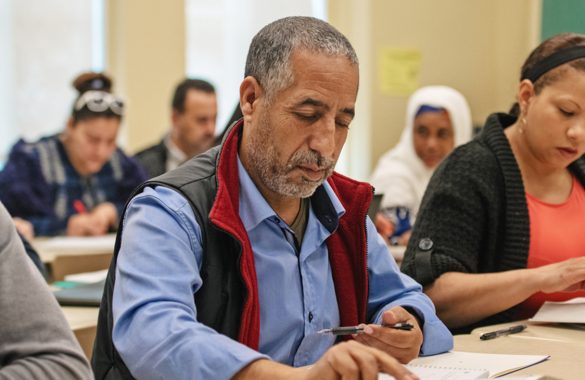
Can a welcoming society’s goodwill translate into better outcomes for refugees? Following the 2022 Russian invasion of Ukraine, many Germans opened their homes to those fleeing the conflict. This unprecedented response from civil society allowed researchers to ask a critical question: Does private hosting by volunteers improve refugees’ integration?
A collaborative team from the German Center for Integration and Migration Research (DeZIM) and Immigration Policy Lab (IPL) investigated the causal effect of private hosting. The team studied the integration of Ukrainian refugees in Germany one year after their arrival by comparing two groups of refugees: those who were placed with private hosts through #UnterkunftUkraine (UU), a large non-profit matching platform, and those who had registered on the platform but were not placed due to high demand, subsequently living in state-run shelters or rented apartments.
Measuring integration outcomes
One year after their arrival, Ukrainian refugees who were privately hosted by volunteers in Germany were better integrated overall than their compatriots who lived in state-run accommodation or rented apartments. The effects are particularly evident in the areas of social, psychological and navigational integration, and are not moderated by gender, age, education or marital status. After one year, no advantages could be demonstrated in terms of linguistic, economic, or political integration.
The research team surveyed 1,700 Ukrainians who had registered on the UU platform and used IPL’s widely adopted Integration Index (IPL-12) to measure how well refugees had integrated by the summer of 2023. The index assesses immigrants’ knowledge and capacity to successfully integrate into their host society. It considers six dimensions: social, psychological, navigational, linguistic, economic, and political. The index for refugees privately hosted was significantly higher than the results for comparable Ukrainian refugees who were in shelters or rented accommodation.
Frequent contact with hosts is a key factor
What explains the differences? The researchers show that refugees who had frequent contact with their hosts experienced particularly high gains in integration. According to the study, many of the privately hosted refugees benefited from help with matters such as residency and welfare applications, job searches, accessing medical services, and enrolling in school and childcare, among other forms of support. More than 60 percent of respondents stayed with their hosts for up to four months, and more than 80 percent paid nothing for it. The most common activity was sharing meals.
While contact with hosts is crucial for the additional integration gains, where privately hosted refugees live is less of a driver. The researchers found that Ukrainians living in private accommodation in more migration-friendly or affluent communities do not achieve significantly greater gains in integration than those privately hosted in other areas. The researchers compared the places of residence of the hosts in terms of median income and unemployment rates, hate crimes, and election results of right-wing populist parties.
LOCATION
Germany
RESEARCH QUESTION
Does the private hosting of refugees improve their integration outcomes?
TEAM
Mathis Herpell
German Centre for Integration and Migration Research (DeZIM)
Moritz Marbach
University College London, Immigration Policy Lab
Niklas Harder
German Centre for Integration and Migration Research (DeZIM), Immigration Policy Lab
Alexandra Orlova
German Centre for Integration and Migration Research (DeZIM)
Dominik Hangartner
ETH Zurich, Immigration Policy Lab
Jens Hainmueller
Stanford University, Immigration Policy Lab
RESEARCH DESIGN
Selection on observables
KEY STAT
Private hosting increases social, psychological, and navigational integration.






